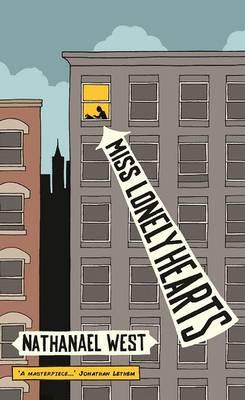Review by Simon Thomas

I toyed with trying to write this entire review of Miss Lonelyhearts (originally published in 1933, now reissued in a beautiful edition by Daunt Books) without giving the game away, but I decided it would be too tricky – and anyway, West reveals all in the first line:
The Miss Lonelyhearts of the New York Post-Dispatch (Are-you-in-trouble? – Do-you-need-advice? – Write-to-Miss-Lonelyhearts-and-she-will-help-you) sat at his desk and stared at a piece of white cardboard.
No, that isn’t a typo – Miss Lonelyhearts is a male. That’s the first step we take into the fairly surreal world of Miss Lonelyhearts (whose real name is never mentioned) and his attempts to have some sort of career satisfaction while bedding women – and avoiding the husbands of women he has bedded. If that sounds trite, then it seems to be deliberately so – like his friend F. Scott Fitzgerald, West takes decadence and dissatisfaction as his topic.
The decadence, truth be told, is of body and mind, but not of material possessions. Miss Lonelyhearts’s career and home are not to be envied, and unlike other writers who have mocked the journalistic profession (Evelyn Waugh, for instance) there doesn’t seem to be any conviviality or wry affection for the role. The letters he receives tread awkwardly between the humorous and the tragic – echoing the Great Depression era (everyone is broke and miserable) but overloading the upsets and misfortunes of the correspondents far beyond the remit of pathos.
It is through these letters that Miss Lonelyhearts meets Mrs Doyle, with whom he begins a torrid and speedy affair, not impeded by her wheelchair-using husband or Miss Lonelyhearts’s own put-upon fiancée Betty. None of these characters are treated with much respect by either Miss Lonelyhearts or by Nathanael West, but instead appear as stray landmarks on a dizzying whirl through the seedier parts of New York.
Many novels have a last-act (as it were) moment where the protagonist reaches a point of self-knowledge. If they can be staring out of a window into the rain, so much the better. Miss Lonelyhearts appears to have an epiphany along these lines, in discussion with Betty:
“Let’s start from the beginning. A man is hired to give advice to the readers of a newspaper. The job is a circulation stunt and the whole staff considers it a joke. He welcomes the job, for it might lead to a gossip column, and anyway he’s tired of being a leg man. He too considers the job a joke, but after several months at it, the joke begins to escape him. He sees that the majority of the letters are profoundly humble pleas for moral and spiritual advice, that they are inarticulate expressions of genuine suffering. He also discovers that his correspondents take him seriously. For the first time in his life, he is forced to examine the values by which he lives. This examination shows him that he is the victim of the joke and not its perpetrator.”
It doesn’t take a psychologist, psychiatrist, or psychoanalyst to work out that this is much more likely to be a moment of delusion. There is no sign that Miss Lonelyhearts is prepared to turn over a new leaf, or ‘examine the values by which he lives’, despite his professions of Christian faith throughout the book. There is barely even a sign that West intends the letters to be ‘profoundly humble pleas for moral and spiritual advice’; it seems far more likely that the writers, Miss Lonelyhearts, Betty, the Doyles, and all are – part and parcel – inextricably tied into the joke that West is perpetrating. The joke is a black comedy, certainly, but there is no opportunity for the characters to raise themselves above the joke, or to examine their predicament with any objectivity.
West’s style is precise and merciless. Not for him the all-encompassing stylistic treatise on America – instead, he sparsely illustrates the disappointing life of a small few. The novel is so short – barely more than a hundred pages – that nothing in it can be verbose. Indeed, it is fitting that West has avoided the grandly-sweeping state-of-the-nation epic, because – by avoiding it – somehow Miss Lonelyhearts is even more evocative of certain people in a certain period. It is a swift and bleak (and yet very darkly funny) portrait of an era which is just as valid, and (I think) rather more readable, than monied young men looking out at green lights.

Simon is one of the Shiny editors.
Read Five Fascinating Facts about Nathanael West
Nathanael West, Miss Lonelyhearts (Daunt, 1933 repr.2014), 110pp.
BUY at Blackwell’s via our affiliate link (free UK P&P)


1 comment
Comments are closed.